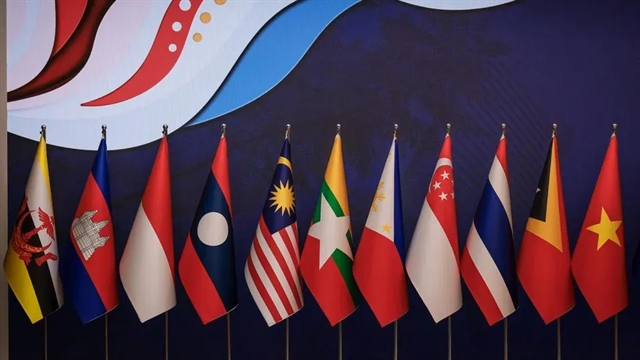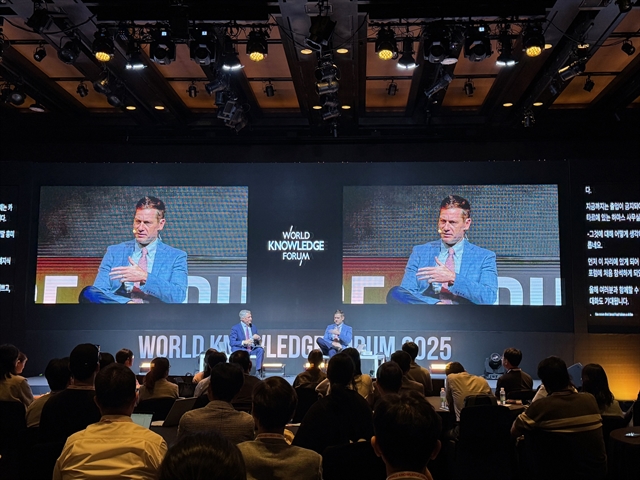 World
World

 |
| Hal Brands, Professor at Johns Hopkins SAIS and Senior Fellow at the American Enterprise Institute, speaks at the ‘Geopolitical Outlook 2026’ session at the 26th World Knowledge Forum. VNS Photo Thu Vân |
Thu Vân
SEOUL — Speaking at the 26th World Knowledge Forum, Hal Brands, Professor at Johns Hopkins SAIS and Senior Fellow at the American Enterprise Institute, took the audience on a sweeping tour of geopolitical hotspots around the world.
Over the course of nearly an hour, he guided the audience across the world’s main flashpoints, including the Middle East to Eastern Europe, onward to Ukraine, and finally the Korean Peninsula, tracing the lines of conflict, power politics and shifting alliances.
Middle East: war without zones of immunity
He began with what he described as one of the most divisive and intractable crises of recent years: the Israel–Hamas war.
On 10 September, Israel struck Hamas offices in Qatar, a country that had previously sought to mediate a ceasefire. The incident, Brands said, was “striking in a couple of ways.”
First, Qatar hosts the largest US military base in the Middle East, and its leaders may have assumed that this status would shield it from foreign aerial attacks. Second, Israeli Prime Minister Benjamin Netanyahu has declared that “there are no zones of immunity” for Israel’s enemies. Brands interpreted this as a sign of a new Israeli security mindset, one prepared to strike Hamas leaders anywhere, even under the protection of a foreign government.
He suggested that the chances of a ceasefire remain slim, noting divisions between Hamas’s external leadership, which is more favourable to negotiations, and those inside Gaza, who are less inclined.
Regional reshaping: Lebanon, Syria, Yemen and Iran
The war has spilled beyond Gaza. Brands pointed to Israel’s confrontation with Hezbollah on its northern border, which he said paved the way for regime change in Syria. In Yemen, Houthi rebels have become far more active, disrupting international shipping through the Red Sea.
The most dramatic turn came with a 12-day conflict in June involving Israel, Iran, and ultimately the United States, which sought to destroy elements of Iran’s nuclear programme. Brands described varying degrees of damage. Some underground facilities were heavily struck by American 'bunker buster' bombs. Others, deeply buried in mountains, were left inaccessible but not destroyed.
“The really important question,” he said, “is what Iran does next.”
In theory, Iran could rebuild a nuclear programme within 10 to 18 months. But any such attempt would invite another strike, and Brands noted that Iranian leaders believe their government is deeply penetrated by Israeli intelligence.
The implications extend far beyond the region, he argued. East Asian countries import large volumes of oil and gas from the Middle East, much of it passing through the Strait of Hormuz. A wider war could disrupt energy flows.
Equally, the strikes on Iran were part of a broader struggle to uphold the nuclear non-proliferation regime, a lesson that resonates in Korea given North Korea’s advanced programme.
“Once countries gain a nuclear capability,” he cautioned, “it’s very difficult to hold that back.”
Ukraine: slim prospects for peace
Turning to Europe, Brands said the chances of peace in Ukraine remain “pretty slim.”
He recalled reports of Russian drones crossing into Poland and being shot down by NATO forces.
“It’s a reminder,” he said, “that while the war has been mostly localised in Ukraine, the longer it goes on, the higher the chances it will spill over.”
US President Donald Trump recently met Russian President Vladimir Putin in Alaska in hopes of pushing toward a peace deal. But Brands said there is little evidence Russia’s objectives have changed.
Brands predicted the war would continue through the end of this year, its outcome determined by whether Ukraine’s military resilience or Russia’s economic capacity gives out first.
Korean Peninsula: new alliances, new dangers
Touching on the Korean Peninsula, Brands highlighted the deepening cooperation between North Korea, Russia and China, underscored by the recent joint appearance of Vladimir Putin and Kim Jong Un in Beijing recently, welcomed by Xi Jinping.
Meanwhile, North Korea’s nuclear and missile capabilities have advanced beyond levels seen at the end of Trump’s first term. Soon, Brands warned, Pyongyang’s intercontinental capabilities could outpace US homeland missile defences.
However, he underlined the significance of the evolving security partnership between South Korea, Japan, and the United States, describing it as one of the most encouraging developments in recent years from Washington’s perspective.
The trilateral framework, he argued, has strengthened deterrence not only on the Korean Peninsula but across the wider region.
He placed this in the broader context of American statecraft in the Asia-Pacific. Unlike in Europe, where NATO provides a single, region-wide alliance structure, the United States has historically relied on a 'hub-and-spokes' system of bilateral alliances in Asia.
That arrangement has often limited coordination and created dilemmas when dealing with cross-regional challenges. Under the Biden administration, efforts have accelerated to build stronger 'connective tissue' between these bilateral relationships, allowing allies to respond more effectively to common threats.
A turning point came at the Camp David summit in 2023, which brought together leaders from Seoul, Tokyo, and Washington. The agreement reached there laid the foundations for closer trilateral coordination, what Brands called a “critical strategic triangle” in Northeast Asia.
This alignment, he noted, provides a stronger collective posture to address the North Korean missile and nuclear threat, while also enabling more effective cooperation on wider security concerns.
While Brands welcomed the progress, he acknowledged uncertainties ahead. Political changes in all three capitals since 2023 have introduced new question marks about how durable this trilateral cooperation will be.
Still, he expressed hope that the United States will remain committed, and that leaders in both South Korea and Japan will continue to invest in the relationship. Strengthening the triangle, he emphasised, is essential for building greater resilience in Northeast Asia against coercion and instability. VNS




